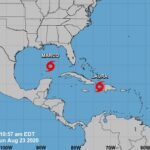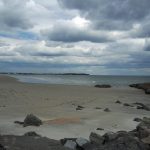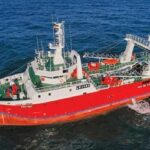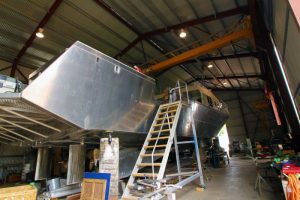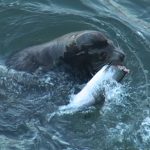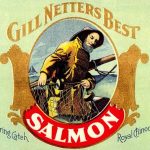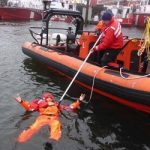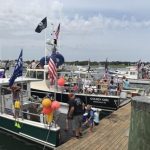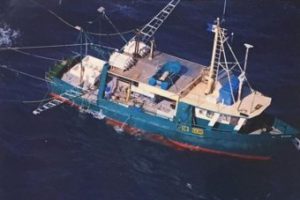Monthly Archives: April 2019
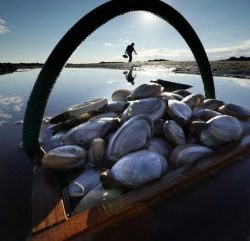
How big should a clam get? Maine eyes new harvest rules
Maine is the country’s leading producer of soft-shell clams, which are steamed or used to make New England staples such as fried clams and clam chowder. The harvest has fallen in recent years to the point where the nationwide haul for 2017 and ’18 was the lowest for any two-year period in more than 60 years. In Maine, the shellfish business is challenged by growing populations of predators that eat clams and a declining number of clammers. >click to read<12:07
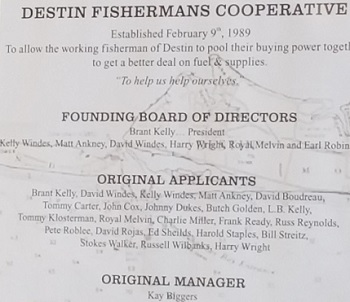
The Destin Fisherman’s Cooperative has provided fuel and supplies since 1989
On Feb. 9, 1989, local fishermen established the co-op to help them and other fishermen to buy discounted fuel. “We had three or four fuel facilities back in the day that were gouging us, and some fishermen expressed an interest in getting some sort of a discount and they laughed at us,” said Kelly Windes, a member of the founding co-op board. “There were a lot more of us than there were of them, so we took control of it.” After buying their own fuel tanks and pumps and finding suppliers, the cooperative opened shop in an old building on March 23, 1989, at what is now HarborWalk Village. >click to read<10:56
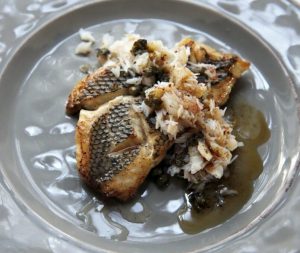
How eating sea bass and crab can help Maine lobstermen
A group of Rhode Island fishermen who witnessed southern New England’s near-shore lobster fishery evaporate and its offshore fishery diminish dramatically in their time on the water came to last month’s Maine Fishermen’s Forum in Rockland to give lobstermen here a bit of seasoned advice: Embrace ecosystem change while you’re in a good position to do so.,,, “As the poster child for a fisherman who has had to adapt to sea change, I can tell you that black sea bass represents a huge opportunity,” said Norbert Stamps, a Barrington, Rhode Island-based offshore lobster fisherman. Even if fishing for black sea bass is only done on a small scale, Stamps said, it can make an impact. >click to read<09:58
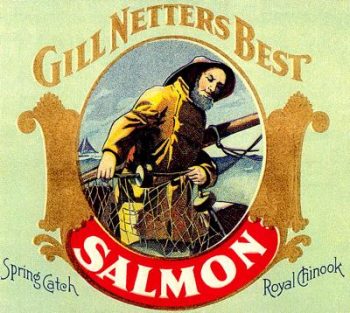
This Nest of Dangers: Gillnetting in 1884, 1887, and 1975
Just now, it’s raining axe handles out there; it’s the weekend of Fisher Poets in Astoria, and I’ve been reading the annual report of the U.S. Life Saving Service from the 1880s. Those Cape Disappointment reports tell of hard work, and a hard life, and a harder death. To begin with, the Life Saving reports describe the gillnet fishery of 1884:,, “In the lower part of the Columbia River there are annually employed at least two thousand of these boats, manned by four thousand fishermen. During the season the fishing goes on day and night,.,,, Nearly a century later, in 1975,, “A long time Bristol Bay fisherman spotted [gillnetter] Les Clark of Chinook [profiled in the April 3, 2019 Observer] on Wednesday, Sept. 17, and asked if he could shake his hand. ‘You’re the only man I’ve ever heard about … who got caught in his net reel and came out of it alive.’ Mr. Clark shook the man’s hand heartily. Great read. >click to read<19:25
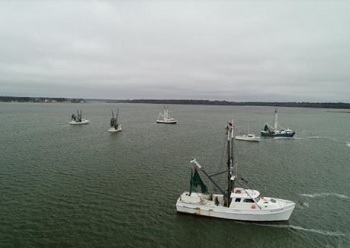
Sneads Ferry fishing community honored at annual Blessing of the Fleet
Reading from II Chronicles, Pastor Dane Yates of Covenant Church urged the fishing and shrimping families of Sneads Ferry to keep strong and not lose hope for there was a reward for their hard work. “Today we’re here to bless our fishing community,” he said in a booming voice that made up for the sounds of the gust and the drone overhead. “They work tirelessly through the winds and the rain and the cold and the heat … they do it day in and day out because they love our community and they love what they do.” Photo’s, >click to read<18:41
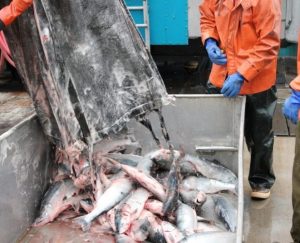
Pebble backs fishermen lawsuit to halt Bristol Bay seafood association’s funding for anti-mine groups
Six Bristol Bay commercial fishermen are suing a regional seafood association they belong to, challenging over $250,000 in contracts it made with groups that advocate against the proposed Pebble Mine. The Pebble Limited Partnership confirmed it is paying for the litigation. The plaintiffs — Trefim Andrew, Tim Anelon, Gary Nielsen, Henry Olympic, Abe Williams and Braden Williams — are challenging the Bristol Bay Regional Seafood Development Association’s recent contracts with SalmonState and the United Tribes of Bristol Bay. Both SalmonState and UTBB are ardent Pebble opponents. >click to read<16:01
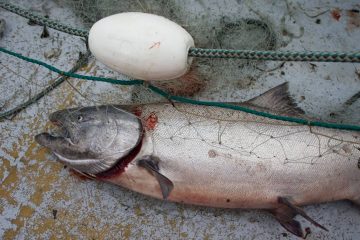
ADFG proposes sweeping changes to Cook Inlet salmon goals
The Alaska Department of Fish and Game’s recommendations for salmon escapement goal ranges in Upper Cook Inlet are out significantly earlier than they have been in past years. Upper Cook Inlet, which reaches north from the Kasilof River, encompasses a number of heavily fished salmon stocks, including the Kenai and Susitna rivers. ADFG reviews the escapement goal ranges for the rivers every three years or so and makes recommendations before the Board of Fisheries takes up the proposals for the area during the in-cycle meeting. >click to read<14:59

A PETITION – Demand Charlton H. Bonham be replaced as Director of the CDFW
The Director has failed the fishermen for years. Crabbers alone have experienced 5 closures in 5 years. Charlton Bonham is trading our harvest rights for his own political gain. >Click to sign the petition< 12:00

Sen. Marco Rubio Reintroduces Bipartisan Bill to Promote U.S. Shark Conservation
U.S. Senators Marco Rubio (R-FL), Lisa Murkowski (R-AK), Dan Sullivan (R-AK), Sheldon Whitehouse (D-RI), and Bill Cassidy (R-LA) reintroduced the Sustainable Shark Fisheries and Trade Act (S. 1008), bicameral legislation that recognizes the sustainable and economically-valuable fishing practices of U.S. shark fishermen and promotes U.S. standards for shark conservation and humane harvest abroad. >click to read<11:19
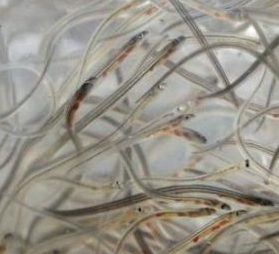
Maine elver season gets slower start, but values still above average
Maine’s elver fishery got its start on 22 March, and at two weeks in, the average price-per-pound is sitting well above historical averages. Maine’s elver fishery made headlines last year as the prices being paid for the baby eels hit historic highs, with some reporting getting prices of over USD 2,500 (EUR 2,225) per pound. Maine Department of Marine Resources landing statistics show that the fishery brought in USD 21.7 million (EUR 19.3 million) in 2018, with an average seasonal price of USD 2,366 (EUR 2,105) per pound, making it the second-most valuable fishery in the state behind lobster. >click to read<10:42
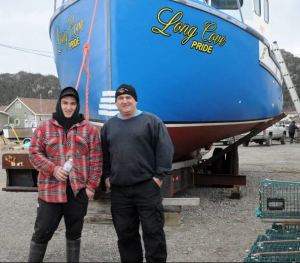
Little Port Harmon fish harvesters hoping for easterly winds
Renny Hickey and Dion Bennett, two fish harvesters out of Little Port Harmon in Stephenville, are wishing for strong easterly winds. That’s because St. George’s Bay is blocked up with the most ice that Hickey says he’s seen there in about 25 years, especially this late. Hickey said he learned Wednesday the crab season is opening this coming Monday and he’s waiting to go but can’t because of the ice in the bay. If the wind from the right direction doesn’t come up before that time, there’s no getting out.Then there’s the lobster season, tentatively set to open on April 18, and he certainly hopes the ice goes out into the Gulf of St. Lawrence before then. >click to read<09:39
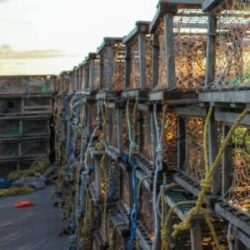
UNACCEPTABLE – Strict right whale protection goal raises concerns among lobstermen
Patrick Keliher, head of the Maine Department of Marine Resources, announced the proposed target at a conference of U.S. and Canadian lobstermen in Portland Friday while defending a decision to cancel three meetings with Maine fishermen to talk about looming right whale protections.,,, The National Marine Fisheries Service estimates that fishing rope entanglement kills or seriously injures five to nine right whales a year,… A few minutes later, Keliher got an email from the fisheries service that spelled out its risk reduction target. Frustrated, he stood up and delivered apparent bad news – he told an already exasperated audience that the service now wanted a 60 percent to 80 percent reduction in the size of the lobster fishery. The room erupted with anger. >click to read<22:49
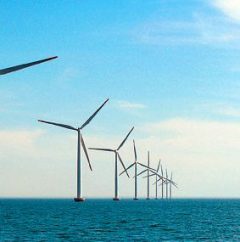
Vineyard Wind to Implement UMass Dartmouth’s Fisheries Monitoring Studies
Vineyard Wind announced today that it will implement recommendations from the University of Massachusetts Dartmouth’s School for Marine Science and Technology (SMAST) to guide the project’s fisheries monitoring studies during construction, as well as to initiate longer-term studies as part of a regional approach to fisheries studies. SMAST’s recommendations were based on its expertise as a leading fisheries research center as well input from active fishermen, government agencies, and academia. >click to read<18:31
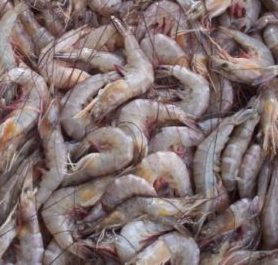
Gulf Council Votes to Relax Quotas on Shrimp Fishing
Today, the Gulf of Mexico Fishery Management Council took final action on shrimp Amendment 18, allowing shrimpers to increase the amount of fishing allowed under the red snapper rebuilding plan. The Southern Shrimp Alliance advocated for this change for more than two years. The Council was unanimous in its decision. Once again, the Alliance won its arguments before regulators by presenting scientific research. The Council’s actions acknowledge that the shrimp fishery has made a substantial contribution to the rebuilding of the red snapper stock. Since the plan went into effect, shrimpers have achieved 100% compliance with the red snapper management plan’s goals. >click to read<17:28
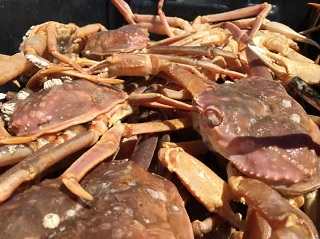
Overall 9% snow crab quota decrease, but one area gets 48% boost
A snow crab fisher on the south coast of Newfoundland is happy to hear that his area is getting a 48 per cent quota increase for this upcoming season. The Department of Fisheries and Oceans released its decision on Wednesday, which outlined an overall nine per cent decrease for the catch. Fishers will get $5.38 a pound for their catch, as well, the price suggestion put forward by the union. Calvin Young, who fishes in the 3Ps area and lands his catch in Branch, said he’s happy to see the big quota boost for his area, but it’s not as big as it sounds. >click to read<15:55
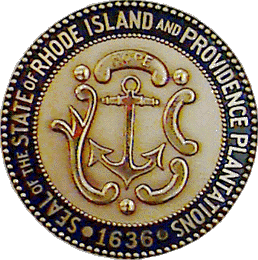
R.I. Senate Resolution – Recognizing the Value on the states rich maritime and fishing history
Recognizing the Value on the states rich maritime and fishing history, and supporting efforts to maintain and ensure the success of the Rhode Island Seafood Industry. Introduced By: Senators Sosnowski, McCaffrey, Algiere, Felag, and Euer, Date Introduced: April 03, 2019, Referred To: Recommended for Immediate Consideration,,, >click to read<14:50
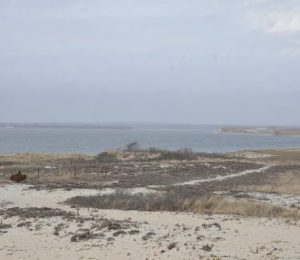
Southampton Trustees Win Appeal Against Brookhaven Baymen’s Association
The Southampton Town Trustees were handed a victory in their long fight against the Brookhaven Baymen’s Association, which fought against Southampton’s rules requiring fishermen to be Southampton Town residents to fish within town waters. In 2009, the Brookhaven Baymen’s Association challenged the Trustees’ authority to make it criminal for non-resident fishermen to harvest migratory fish in town waters. The lawsuit was filed after an incident the year before, when a bayman from Brookhaven was ticketed by the Town of Southampton for anchoring a gill net in Moriches Bay. >click to read<12:53

DMF Sends Hurricane Florence Commercial Fishing Relief Checks
Gov. Roy Cooper’s office announced Friday that a second round of assistance checks is on the way to North Carolina commercial fishermen affected by Hurricane Florence. The North Carolina Department of Environmental Quality’s Division of Marine Fisheries is distributing checks from $11.6 million available under the Hurricane Florence Commercial Fishing Assistance Program. The latest distribution includes 1,002 checks totaling more than $7.23 million to fishermen to help compensate for October and November harvest reductions due to Hurricane Florence, according to the governor’s office. >click to read<12:13
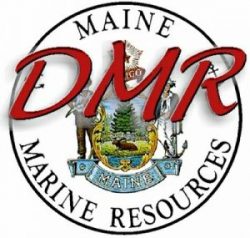
Maine cancels right whale meetings with lobster industry
The state Department of Marine Resources is canceling a series of meetings with the lobster industry next week to talk about right whale protections, saying it has nothing new to present to lobstermen until federal officials clearly identify a risk reduction target. The National Marine Fisheries Service, which is tasked with protecting right whales from entanglement in lobster fishing gear, is introducing new scientific methodologies and analyses that could cause large-scale changes to the lobster industry, Commissioner Patrick Keliher said. >click to read<11:11
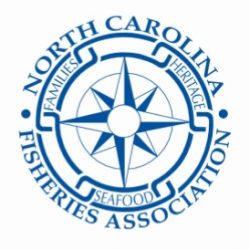
North Carolina Fisheries Association Weekly Update for April 5, 2019
>Click here to read the Weekly Update<, to read all the updates >click here<, for older updates listed as NCFA >click here< 10:30
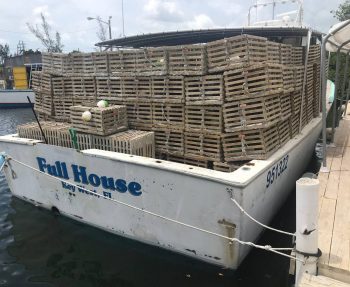
China bought lots of Florida lobster despite tariffs. Keys fishermen paid the price
Chinese importers bought Florida spiny lobsters in what could be near-record numbers this season, despite a 25 percent tariff their government placed on U.S. seafood last July, according to the leading Florida Keys commercial fishermen’s trade group. That’s great news considering the fear commercial anglers had about the potential impact of growing U.S.-China trade hostilities on one of South Florida’s largest industries. “Going into the season, the big questions were: Will the Chinese buy? How much and at what price,” >click to read<20:25
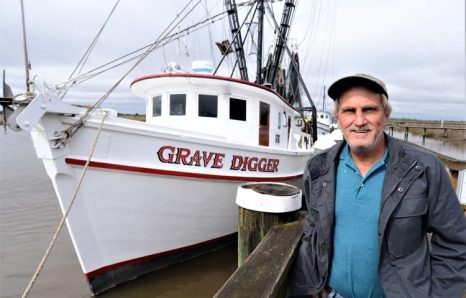
Blessing of the Fleet returns to Darien Friday – Information, and event schedules
A walk along the Darien waterfront usually comes with the smell of the marsh and the saltwater river. During a week in early April, however, the smell of new paint comes through as shrimp boat owners layer gleaming, fresh coats on their vessels and touch up the names on the sterns. All the work is done for the annual Blessing of the Fleet, a three-day festival that starts Friday and culminates Sunday afternoon as members of the clergy shower holy water onto the boats as they sail up to the U.S. 17 bridge. >click to read< >Blessing of the Fleet Website >Info and Schedules >click to read>
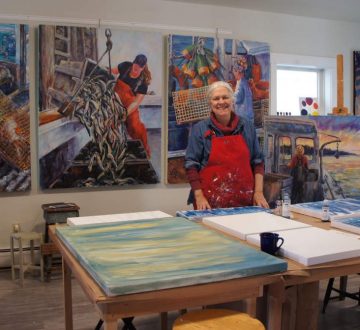
Painting the ‘Lobstering Women of Maine’
“It started with Suzanna, that one right there,” White said in late March, pointing to a large painting in her Church Street studio, just around the corner from Belfast Historical Society Museum. In November 2017, White said she watched the painting’s subject unloading lobster traps at Belfast Harbor. A sternman on her husband’s boat, the woman was clearly in charge of her territory. White said she watched in awe. “She unloaded every one of them and, hey, there’s no way! My husband fishes; there’s no way I’d be doing that,” White said. The experience that snow-dusted day got White thinking. She’d painted many lobster fishermen over the years — but never a woman. That was going to change. “I get these ideas, you know? But I don’t think I’ve ever been so obsessed about >click to read<
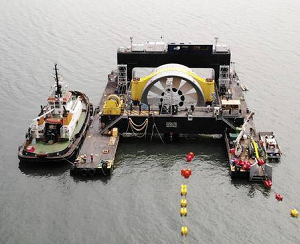
Bankrupt company ordered to remove defunct Minas Basin tidal turbine
The government issued a strongly worded order Wednesday to a company that is functionally non-existent. “(Cape Sharp Tidal) is now required to retrieve its turbine in the Minas Basin,” read the Department of Energy and Mines news release announcing the revocation of Cape Sharp Tidal Venture’s marine renewable electricity licence. “If that does not happen in a reasonable timeframe, government will begin the process of accessing the security that remains in place.” But Cape Sharp Tidal Ventures exists only in name. >click to read<14:09
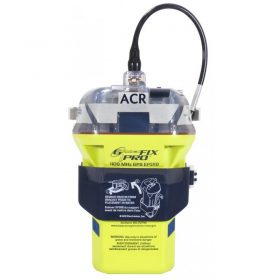
406 Day: National Campaign for Awareness of EPIRB, Emergency Locator Beacon Importance
Editor’s Note: Coast Guard members in your area may be available to discuss 406 Day and the importance of EPIRBs and PLBs.,,,Saturday, April 6, is 406 Day, a national campaign run by NOAA to spread awareness of the importance of emergency position indicating radio beacons, or EPIRBS, and personal locator beacons, or PLBs, in boating safety. In 2018, the Eighth Coast Guard District responded to over 200 distress signals from EPIRBS aboard aircraft and boats. An EPIRB works by transmitting a signal that is picked up by a satellite and then relayed to a rescue coordination center. >click to read<13:41

Letter to the Editor – FFAW fighting for itself, not the fishery
The FFAW-Unifor demonstration March 20 through downtown St. John’s was described to me as a “march of deception.” I disagreed — no one’ s been deceived. The facts have been laid out for all to see over the two and a half years that FISH-NL has battled the FFAW. Instead, I would call the protest a “march of madness.” FFAW supporters demonstrated to “fight for the future of our fisheries” when it’s the union itself that has been threatening their survival. The FFAW-Unifor is in a conflict of interest in representing inshore harvesters/plant workers/offshore trawler men/aquaculture workers/oil tanker workers/cold storage workers/Long Harbour workers, etc. >click to read< by Ryan Cleary 11:31
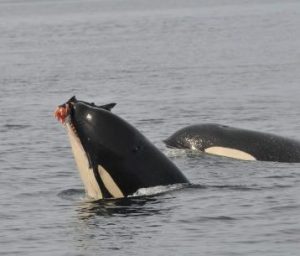
Environmental groups sue to restrict salmon fishing for Northwest orcas
The Center for Biological Diversity, which filed a lawsuit nearly two decades ago to force the U.S. government to list the orcas as endangered, and the Wild Fish Conservancy asked the U.S. District Court in Seattle on Wednesday to order officials to reconsider a 2009 finding that commercial and recreational fisheries did not jeopardize the orcas’ survival. >Video, click to read<10:09

Copeland man pleads not guilty to killing his father aboard fishing vessel
Casey Hickok, the Copeland man charged with killing his father aboard a fishing vessel about 66 miles west of Marco Island last month, pleaded not guilty Wednesday at the federal courthouse in Fort Myers. Robert Hickok, 54, also of Copeland, was sleeping when he was bludgeoned to death by his 32-year-old son within the special maritime and territorial jurisdiction of the U.S., according to a criminal complaint filed by the U.S. Attorney’s Office. Casey Hickok was charged with second-degree murder when the criminal complaint was filed on March 19. >click to read<09:15

Ottawa reverses cut to Gulf shrimp quota; FISH-NL savours win for inshore harvesters
The Federation of Independent Sea Harvesters of Newfoundland and Labrador (FISH-NL) is pleased to learn that Fisheries and Oceans has reversed its decision to cut the 2019 northern shrimp quota in the Gulf of St. Lawrence for the province’s inshore harvesters. “Some fishermen from the Great Northern Peninsula see the decision as a sign that Ottawa may finally be listening to them,” says Ryan Cleary, President of FISH-NL. “What we know for certain is our shrimp fleet in the Gulf has been hit particularly hard by quota cuts in recent years and they’ve worked hard to turn the stock around. FISH-NL savours the win for inshore harvesters.” >click to read<19:39
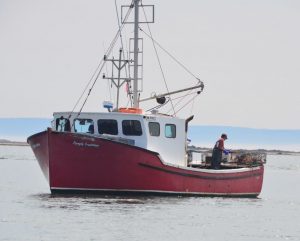
Canadian-U.S. Lobstermen’s Town Meeting set for this weekend
The University of Maine’s Lobster Institute will host the 15th edition of the Canadian-U.S. Lobstermen’s Town Meeting at the Westin Portland Harborview Hotel on Friday and Saturday, April 5 and 6. The theme of this year’s meeting is “Two Nations, Two Fisheries: Shared Challenges, Shared Opportunities.” Lobstermen, dealers, processors, scientists and policymakers from the Northeast United States and Atlantic Canada will gather together for discussions about the status of the lobster resource and the business of lobstering. >click to read<19:06

































